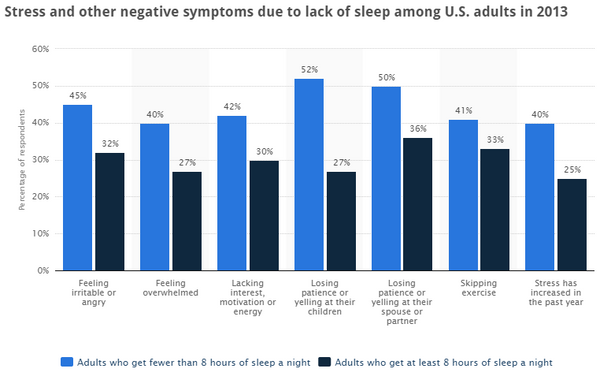We all know that sleep is good for us and so most of us try different techniques to help improve both our quality and quantity of sleep.
But did you know that where you live in the world can affect your sleep patterns too?

Depending on where you live within a time zone, your experience of day and night cycles vary. Recent research shows that Americans living “near the immediate eastern side of the US time-zone boundaries have been shown to achieve a significant 20–25 minutes less sleep per night (on average) than those living near the immediate western side of the same time-zone boundary.”
This might not seem like much, but this graph shows just how much of an effect having less than eight hours of sleep can make. Every minute counts.

Writing for The Conversation, Richard G. Stevens, Professor in the School of Medicine at the University of Connecticut illustrates this difference with the example of Nashville, Tennessee and Amarillo, Texas:
The sun both rises and sets later in the western parts of time zones, by about an hour at the extremes.
"If sunrise in Nashville, Tennessee is 6:30 a.m., it’s about 7:30 a.m. in Amarillo, Texas. Similarly, if sunset in Nashville is 8 p.m., it’s about 9 p.m. in Amarillo. Yet both are in the Central time zone.
"This means that many people in Amarillo must get up before sunrise to get to work on time compared to people in Nashville, who can get up after sunrise.
"For sleep, this especially makes a difference in the evening."
While the body’s natural internal clock (also known as your circadian rhythms) influences its production, the amount of light that you’re exposed to each day also helps to determine how much melatonin is made. Melatonin is a hormone that makes us feel more tired.
Research published in 2017 explains:
“Because of the delayed onset of daylight and the biological link between environmental light and the production of melatonin throughout the day, individuals on the late sunset side of a time zone boundary will tend to go to bed at a later time.”

Of course, whether you live on the right or left side of a time zone boundary, there is always the same number of hours and minutes of daylight. It’s how this daylight matches our social schedules of work, leisure and sleep time that’s important.
It’s not that we are no longer physically able to follow our natural circadian rhythms, more that our societies aren’t flexible around them - and ultimately people on the borders of time zones are sleeping less as a result.
